- About Us
- Columns
- Letters
- Cartoons
- The Udder Limits
- Archives
- Ezy Reading Archive
- 2024 Cud Archives
- 2023 Cud Archives
- 2022 Cud Archives
- 2021 Cud Archives
- 2020 Cud Archives
- 2015-2019
- 2010-2014
- 2004-2009
 |
Cud Flashes In The Pan |
John Ronald Reuel Tolkien didn't know what he was starting when he wrote The Hobbit in 1937 and The Lord of the Rings in 1953. Those works helped launch an explosion of interest in what became known as "sword & sorcery," characterized by a pseudo-Medieval, magic-oriented setting. In the 1970s, Dave Arneson and Gary Gygax, both trying to make tabletop wargaming more exciting, merged two unique ideas: playing individual characters instead of entire armies, and incorporating magic and mythical beasts. That first role-playing game, Dungeons & Dragons, spawned an entire industry of such RPGs set in every imaginable genre, but “sword & sorcery” has been by far the most popular. The passing of Gygax in 2008 and Arneson in 2009 perhaps marks the end of an era, but we'll honor them by honoring Tolkein, the man who started that era, who died September 2, 1973.
“Controlling Destiny”
By David M. Fitzpatrick
After an hour slaughtering them, hordes of orcs bore swarmed towards us from all directions. They seemed endless. Bodies were everywhere; the rocky terrain soaked with blood. My comrades had killed a thousand with weapons, and I’d exhausted my magic killing ten times that. The legions of screaming, armored, creatures closed.
"We're screwed," said the dwarf Mugli, readying his battle-axe nonetheless.
The warrior Ogarn hefted his massive sword and looked at me through his visor. "Any spells left, Jerrick?"
I shook my head; I'd exhausted my magical arensal. I'd force-blasted, wind-gusted, fireballed, ice-stormed, and disintegrated them. I‘d turned rock to mud, sticks to snakes, and orcs to stone. But still they came. Years of mastering powerful magicks meant nothing; I was out of tricks. No more spells. A drained wand. An empty magic ring. A dead teleportation amulet. I had failed my friends, despite all my power.
I had only one hope left—a dangerous enchanted sextet that worked based on luck. I’d never dared use them, but I had no choice. I pulled out the small velvet bag and dumped its contents into my hand.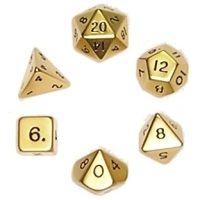
"You're kidding!" cried the halfling Fraklee above the thunderous noise of the approaching hordes, wide-eyed as she readied her twin daggers. "This is no time for games!"
It was a set of golden polyhedral dice with numbered faces: four, six, eight, ten, twelve, and twenty sides. I could see their enchanted auras. "They're magic," I hollered. "I can’t control the results. The lower I roll, the better. High rolls can be very bad for us.”
"I‘d say we have little choice!" Ogarn yelled.
"Toss them!" Mugli cried through his thick beard. The enemy was nearly upon us.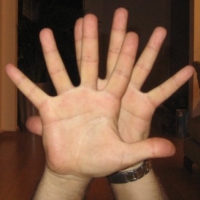
I tossed them into the air, and we watched them fall toward the bloody rock—and misery overwhelmed me, for I had failed, and was relying on deadly chance—
—and I remembered my earliest teachings: petty magic, the masters called it. The simplest spells, the most basic cantrips we’d first learned. We’d felt like grand masters when we’d first magically colored stones, caused paper to combust, rendered coins invisible... or made small objects move.
I mentally worked an impromptu cantrip and waved my hands as the dice clattered and danced across the rock. I grabbed them all with my simple spell—and caused each to stop with the number "1" facing up.
***
We prevailed.
We were a hundred feet tall. Fraklee breathed gale-force winds and threw her giant daggers like boomerangs. I clapped sonic blasts and rained boulders from the sky. Ogarn fired blue energy beams from his eyes and split the earth with his sword. And Mugli pissed a tidal wave and farted fireballs. The half-million orcs never stood a chance.
One dangerous magic item was all it took... and some of the basics from my earliest days of magic-using to control it. Who says a master can't benefit from the very basics of his art?
“The Pains of Tradition”
By David M. Fitzpatrick
Selkor, a goblin priestess, and Faleif, an elf princess, met by happenstance one day, deep in the woods. Such friendships were outlawed by their peoples, which had warred with absolute hatred for countless centuries. But they saw that hatred as foolish, and quickly became friends.
They kept their friendship secret, sneaking away to be together. Unlike their racial norms, they weren’t repulsed by each other. Faleif found Selkor’s green skin and pink eyes exotic and beautiful, and loved touching her short blue hair. Selkor was intrigued by Faleif’s pointed ears and her fair skin, and loved running her fingers through the elf’s long, golden hair.
As their friendship deepened, young sexuality took hold, and they fell in love. When they finally consummated their romance in a thatched hut they’d built deep in the woods, it was incredible and erotic, exciting and bursting with emotions. They knew they’d be together forever.
But Jeddar, a young elven suitor constantly frustrated by Faleif rebuking his advances, grew suspicious of her absences—and the glowing smile always on her heart-shaped face. One day he followed her to the hut, and when he found her entwined nude with her goblin lover, he was outraged.
He hauled Faleif back to the clan and before the Elder Council. The charges were serious: associating with a goblin, sex with a goblin, sex with another female, sex while unmarried, and associating with one who followed the wrong deities.
“It’s my life to live as I please!” Faleif cried.
“It is not,” said the Grand Elder. “We strive to preserve our great culture, and to teach others to live as we do. You have damaged our culture, endangered our traditions, and set an example that others might follow.”
“But we’re in love,” Faleif said. “That’s all that matters—not old traditions and what others think.”
“You have a choice,” the Grand Elder said with darkening eyes. “Swear to uphold our ways and never see that goblin again; or proclaim your love for her once more—and be executed.”
“Then execute me,” Faleif said without hesitation. “I’ll never deny my feelings for Selkor—not for outdated cultural ideals, or hatred, or arrogance, or intolerance. I’m in love with her, in this life and the next, and would rather die than be without her.”
Within minutes, they’d hung a noose and prepared to string Faleif up. But just as they were, there was a flash of light and Selkor appeared out of thin air, brandishing a magic amulet. The elves cried out in surprise, but the goblin priestess wrapped her green arm around Faleif and the amulet glowed brightly blue—and the pair vanished.
***
Alone together in their woodland hut, the lovers kissed and hugged amid tears. “We must flee,” Faleif said. “They’ll kill us if they find us.”
“As will my people,” Selkor said. “We’ll search for a land where such hatred doesn’t exist.”
They traveled the world for years, and they never did find that land—for hatred and intolerance existed wherever they went, in some form or another. But they had their love, and as Faleif had said, that was truly all that mattered.
"Rescuing the Maidenhead"
by David M. Fitzpatrick
Renn Tierney stared at the vast stone keep atop the mountain peak high above, recalling the king’s disturbing orders: Rescue Princess Sheena from Lord Killiac‘s mountain keep. That part was easy.
“It’s important to this kingdom that my daughter is still a virgin,” the king said. “You will inspect her to determine whether her maidenhead is intact. If so, bring her to me, and I’ll reward you a hundred platinum. But if she has been defiled, the reward is half that, and you’ll bring her ring to me—and leave her there.”
Tierney was a good and honest man, and partnering in this endeavor was detestable. He’d steeled his will and agreed to the king’s hateful orders, praying that Sheena was undefiled.
He regarded the mountaintop. Tierney was known as the “mercenary with a thousand magical tricks.” It wasn't true, but it got him jobs. In reality, he had just a few tricks.
He drew his spyglass and extended it. He spun the various rings to zoom, to focus—and to see through the keep’s stone walls. Guards moving through corridors… servants tending to rooms… Lord Kalliac screwing some wenches. It took some time, but he finally found Princess Sheena. She was in a dungeon cell, chained to the wall by her ankle. She looked small and scared, barely a woman, and far too beautiful for that place.
Tierney memorized every detail of the scene. Then he sheathed the spyglass and twisted his diamond ring, concentrating on the mental image. The diamond glowed as he spun it…
…and in a flash of light and puff of smoke, he was in the cell. The princess looked up in surprise, face lighting up.
"Are you here to rescue me?" Sheena cried.
"Yes—but no time to talk," he said. He drew his magic sword and easily slashed the chain binding her. Already, he heard guards thundering down the hallway, his arrival detected. He gathered Sheena in his arms, spun his ring again…
…and they were safely in Tierney's home, a thousand miles away.
***
He let her bathe and provided her a ragged old dress not suitable for a princess. She still looked beautiful, and she smiled and thanked him. "I trust my father will reward you well,” she said.
It was awkward, as he’d expected. "Princess, I'm under... strict orders," he said, and stumbled through an embarrassing explanation of his unfortunate task. She looked horrified at first, but when he told her that he was to abandon her if she’d been defiled, she seemed to lose all life. She staggered to the bed, lay down, and awaited his intrusion.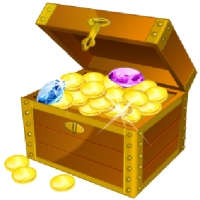
“I had to tell you about my orders,” he said, “but I won’t be inspecting you.”
She looked at him, confused.
“This task has disturbed me greatly, My Lady,” he said. “I resolved to rescue you, nothing more. I’ll return you to your father, but collect no reward. Perhaps it's time to hang up my sword and just do a bit of farming."
She was awed as she sat up, regarding him with renewed interest. "That sounds far more pleasant than the life I’ve led,” she said. “And you are truly the finest gentleman.” Then her face lit up. “Renn… what if I could offer you a reward of my own?"
***
He used the spyglass on the king’s castle, and then spent several hours teleporting, emptying her dowry chest.
Then he visited the castle with Sheena’s ring, informing the king that Sheena was no longer virgin. The king cursed her name, but paid Tierney his reward.
Tierney felt good. He hadn't lied, and really hadn’t stolen the dowry. No; after the previous evening, the new Mrs. Sheena Tierney was no longer a virgin.
"Incarnation Incantation "
by David M. Fitzpatrick
After a thousand years, the old wizard’s magic couldn’t sustain him any longer. He needed to send his soul into a newborn body, so that he'd live again. He used magic to search the expectant mothers of the surrounding land.
He found a healthy young boy, the child of intelligent parents with good physical form. He worked his spell, reciting the incantation, and his mind spun as he connected with the embryo, partnering with its young soul. At the moment of its birth, it would happen.
Eight months later, the old wizard felt the psychic tug as the fetus underwent the trauma of childbirth, and felt his heart spasm. He staggered to the bed and collapsed; with every contraction, his body seized. And when the child took its first breath, the wizard took his last.
***
Lucas was a prodigy, walking by ten months and speaking in complete sentences by eighteen months. He could read before age three, and he was a natural with several musical instruments by five. But at twelve, Lucas was able to spontaneously work simple magic spells—conjuring small insects out of thin air, levitating fruit at the table, freezing a glass of water with a touch. His parents were awed and afraid, and for reasons Lucas didn’t understand, he felt the need to leave home.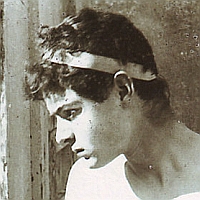
He journeyed for a week until he found an old stone tower, deep in the forest, and he felt drawn to climb the winding staircase to the top floor. There, he found a robed skeleton on the bed, dead nearly ten years.
He was confused, but then he felt a powerful tug on his mind. He staggered where he stood.
It is time, he heard a voice in his head. I will be reincarnated in you, Lucas. You’ll experience the greatness that is one of the most powerful wizards who has ever lived—for I shall live again, in you.
“But… what will happen to me?” Lucas said aloud.
You’ll still be there, watching and feeling all that I do. This is a great honor!
“I don’t want to,” Lucas said. “I want to be my own person.”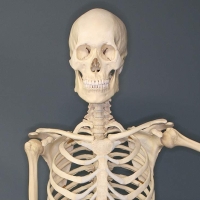
Your life is nothing without me, boy. The magic you’ve experienced—that’s my power within you. Think of the things you’ll experience with me!
The skeleton of the dead wizard suddenly arose, bones clattering. Teeth chattered in the skull as the skeleton advanced, bony hands raised.
I’ll work the spell to bring myself forth. Don’t fight me, child.
As Lucas felt the wizard surfacing, pushing his young mind aside, he realized what the warning meant: He could fight the wizard.
The stronger the wizard became, the more Lucas understood magical powers far beyond anything he’d imagined. He saw centuries of magical study and skill, imprinting on his brain as the dead wizard tried to overtake him. And he realized he could use it.
He drew on the wizard's knowledge and power and threw up magic he didn't fully understand. He held up his hands and launched brilliant green magic against the animated skeleton.
What are you doing?!
Lucas pushed against the skeleton, against the mind within his mind, with arcane forces, and the green magic exploded again. The skeleton flew across the room and into the wall, and the bones of the wizard exploded into white dust.
Damn child! I’ll destroy you and find another!
"I don't think so," Lucas said, and let loose with a blast of magic that exploded inside him and blew the life force of the dead wizard out of his mind forever. The skeleton collapsed, its bones turning to dust, and he heard the psychic scream of the wizard fade quickly away.
Lucas took a deep breath. He was his own self, but in possession of knowledge and power he didn't understand—but he liked it. He knew then that, with proper study, he could become a greater wizard than his invader had been.
Only he’d dedicate his life to not being a total bastard like that asshole.
“The Dragon’s Treasure”
By David M. Fitzpatrick
After years of adults warning him away from the dragon’s mountain, wondering about the dragon’s treasure got the best of young Devon. He knew the dragon left every morning for several hours; he’d climb early, escape with some treasure, and return whenever he pleased.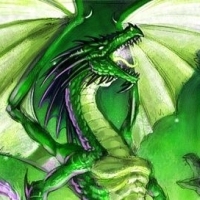
Devon started before daybreak and reached the plateau just as the sun flamed on the horizon—and as the dragon thundered out of its cave. Devon watched from behind a boulder as the gigantic reptile spread its leathery wings, green scales gleaming in the morning sun. The dragon sniffed the air, whipped its serpentine tail, beat its wings; then it lumbered for the plateau's edge and took flight. When it was a distant speck on the horizon, Devon rushed into the cave, heart pounding, and beheld the treasure.
The cavern was two hundred feet and a hundred wide. But there were no chests of gold or piles of silver, no gems or jewels. Instead, shelves lined the walls. Countless thousands of books were stacked high and piled deep. Devon had never seen—or imagined—so many books.
"I’ve risked my life for… books?" Devon cried.
"Yes," boomed a voice, and Devon spun around.
The dragon, the size of six elephants, stood at the cave mouth. Devon began to shake.
"These books contain greater treasures than all the world’s gold,“ said the dragon. “They’re why I’ve learned everything from science to magic. Now, I should kill you, boy, but you amuse me. Your choice: be roasted alive, or read a book and learn something.”
“I… I can’t read,” Devon said. “Commoners never learn.”
The dragon sighed, smoke puffing from his mouth. “Damn humans.”
***
First, Zelg, the dragon, taught Devon to read. And for three years, Devon returned frequently to the mountain cavern to read ravenously. He learned more than he imagined learnable, about things he’d never have known. Zelg even taught him the basics of magic.
One day, while the pair were engrossed in various tomes, a dragonslayer on a winged horse landed outside the cave and challenged Zelg to fight. He was bedecked in gleaming armor and brandishing a shiny dagger.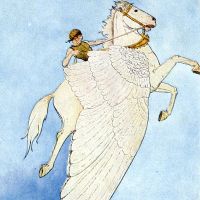
Zelg sighed. "Sorry, Devon, but if I don't kill him, he'll never leave."
He lumbered out of the cavern to face the warrior. Devon watched in awe as Zelg drew in a deep breath, preparing to destroy the slayer alive with his fiery breath.
But the slayer only pointed his dagger at the dragon—and a bolt of red light erupted from it. It engulfed Zelg, who roared in anguish—and vanished.
A grapefruit-sized red crystal ball clattered to the rock.
Devon screamed, running forward, collapsing to his knees, and grabbing the orb. Frozen within, he could see a tiny Zelg. “What have you done to my friend?” he cried.
The slayer scoffed. “You choose your friends poorly, boy.” He turned, surveying the shelves, furrowing his brow, and he cursed. "No treasure? This was a waste of time—hardly worth using my dagger’s power.”
The slayer headed for the cave mouth, but Devon called out, “Slayer—what do they call that magical dagger?”
The man turned and proudly held up his weapon. “The Dragoncell Blade, boy, wielded by legendary slayers for a thousand years.”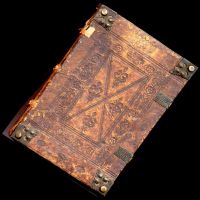
By the time the slayer’s mount took wing, Devon was scrambling for the bookshelves.
***
It took weeks of scouring before he found writings about the Dragoncell Blade, weeks more to find the right spells, and months of study to hone his meager skills enough to work them. When he did, Zelg was restored in a flash of red light—roaring, furious, and ready to take flight in search of the slayer. But Devon stopped him.
"You taught me the importance of books," Devon said, "and I used them to save you. Forget the slayer, and keep teaching me—so that next time I’ll be a stronger wizard, and quicker to save you.”
Zelg surveyed Devon with a smile of sharp teeth and glinting yellow eyes. "Wise choice," he said. "Yes, let's do that."
David M. Fitzpatrick is a fiction writer in Maine, USA. His many short-stories have appeared in print magazines and anthologies around the world. He writes for a newspaper, writes fiction, edits anthologies and teaches creative writing. Visit him at www.fitz42.net/writer to learn more.
